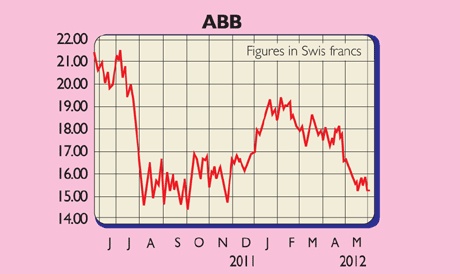Get the latest financial news, insights and expert analysis from our award-winning MoneyWeek team, to help you understand what really matters when it comes to your finances.
You are now subscribed
Your newsletter sign-up was successful
Want to add more newsletters?

Twice daily
MoneyWeek
Get the latest financial news, insights and expert analysis from our award-winning MoneyWeek team, to help you understand what really matters when it comes to your finances.

Four times a week
Look After My Bills
Sign up to our free money-saving newsletter, filled with the latest news and expert advice to help you find the best tips and deals for managing your bills. Start saving today!
The recent equity sell-off has forced speculators to dump stocks on to the market at distressed levels. For long-term investors, this creates opportunities. Take ABB, Switzerland's power transmission and factory automation champion. It is the world's largest maker of electricity grids and a leader in high-voltage direct current (HVDC) which can significantly reduce power loss over transmission lines.
However, its shares have dropped 30% in the past year even though it has no credit worries. In May it issued $1.25bn of ten-year paper offering a yield just shy of 3%. That's less than half the level being paid by Italy and Spain.
What's more, the fundamentals are rock solid. Developing countries need to build infrastructure whilst developed ones are updating theirs to lift energy efficiency. ABB is also winning work from smaller rivals as customers migrate to the stronger players it is very difficult to compete in this space without global scale, established brands and lean supply chains.
MoneyWeek
Subscribe to MoneyWeek today and get your first six magazine issues absolutely FREE

Sign up to Money Morning
Don't miss the latest investment and personal finances news, market analysis, plus money-saving tips with our free twice-daily newsletter
Don't miss the latest investment and personal finances news, market analysis, plus money-saving tips with our free twice-daily newsletter
So, in quarter one turnover was up 6%, led by a 15% jump in discrete automation/ motion, 12% in services and 9% in power products. The order book closed in March at a near-record high of $29.9bn. That said, demand around the Mediterranean is weak, and margins in its Chinese arm are being hit by falling prices.
ABB (Zurich: ABBN), rated a BUY by William Blair

However, a resurgent North America has offset these problems. Cost savings of $262m thanks to better sourcing and productivity have also helped. CEO Joe Hogan said he was aiming for profitable growth in 2012 and a rise in the operating margin from 11.8% last year. Greater investment in innovation should also boost profits.
For 2012 the City is forecasting revenues and earnings per share (EPS) of $37.1bn and $1.40 respectively, rising to $40.9bn and $1.50 in 2013. That puts the shares on a price/earnings (p/e) ratio of 11.5. I would value the group on an EBITA multiple of 11. Adjusting for the net cash of $1.4bn (as at March) and $1.5bn pension deficit generates an intrinsic worth of SFR22 per share. With state-of-the-art technology across a broad range of territories, ABB gets the thumbs up from me.
William Blair has a price target of SFR24; second-quarter results are due on 26 July.
Rating: BUY at SFR15.60
Paul Hill also writes a weekly share-tipping newsletter, Precision Guided Investments. See www.moneyweek.com/PGI or phone 020-7633 3634 for more.
Get the latest financial news, insights and expert analysis from our award-winning MoneyWeek team, to help you understand what really matters when it comes to your finances.
Paul gained a degree in electrical engineering and went on to qualify as a chartered management accountant. He has extensive corporate finance and investment experience and is a member of the Securities Institute.
Over the past 16 years Paul has held top-level financial management and M&A roles for blue-chip companies such as O2, GKN and Unilever. He is now director of his own capital investment and consultancy firm, PMH Capital Limited.
Paul is an expert at analysing companies in new, fast-growing markets, and is an extremely shrewd stock-picker.
-
 New PM Sanae Takaichi has a mandate and a plan to boost Japan's economy
New PM Sanae Takaichi has a mandate and a plan to boost Japan's economyOpinion Markets applauded new prime minister Sanae Takaichi’s victory – and Japan's economy and stockmarket have further to climb, says Merryn Somerset Webb
-
 Plan 2 student loans: a tax on aspiration?
Plan 2 student loans: a tax on aspiration?The Plan 2 student loan system is not only unfair, but introduces perverse incentives that act as a brake on growth and productivity. Change is overdue, says Simon Wilson